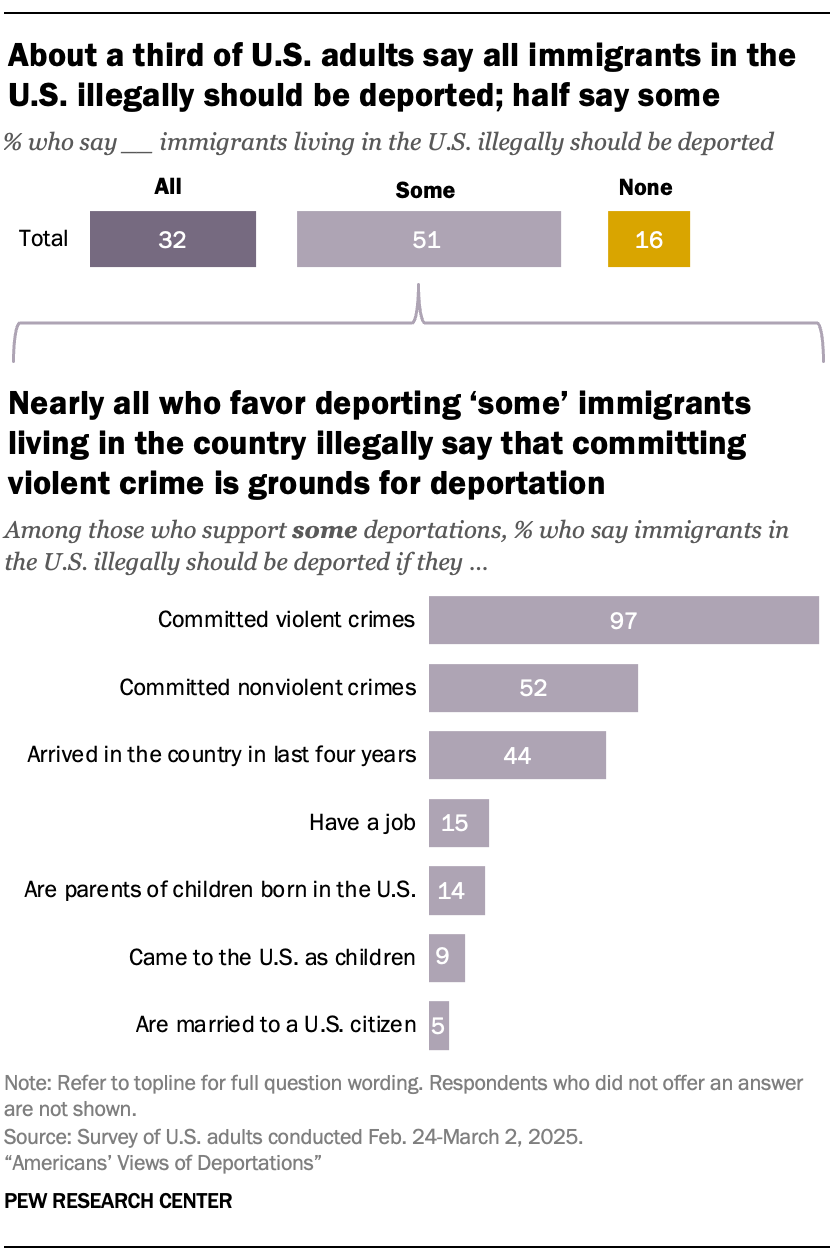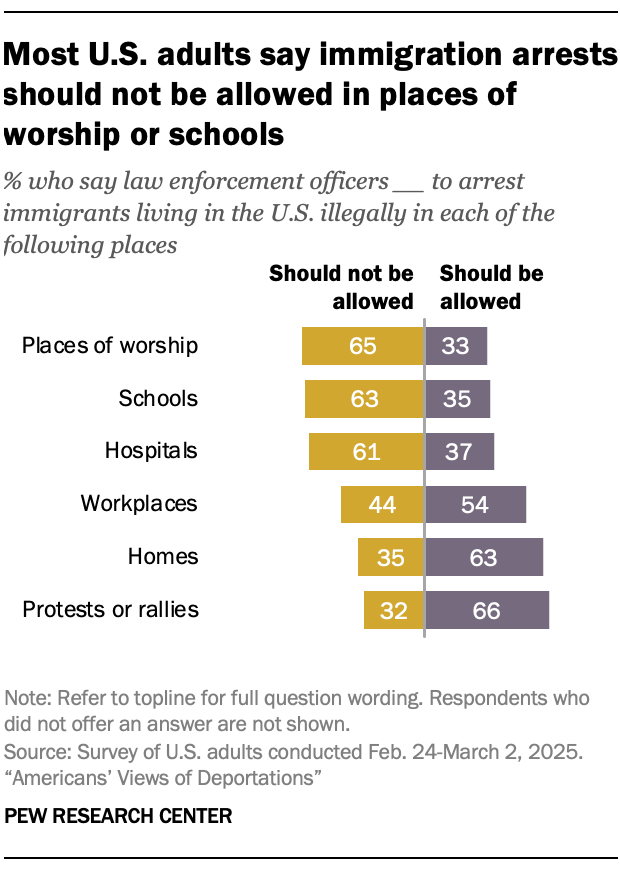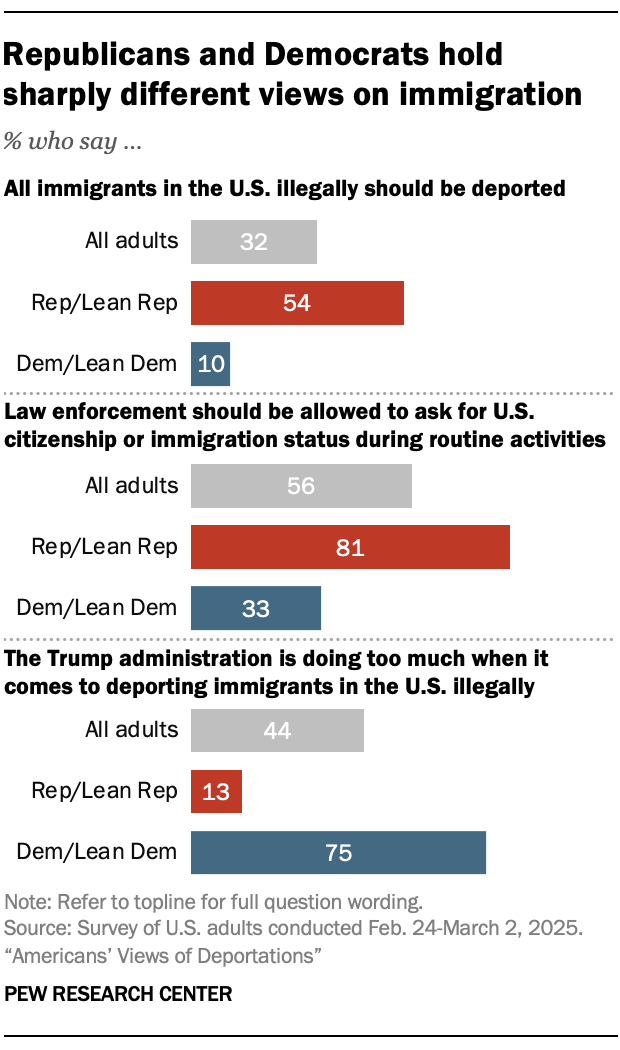Most say arrests of immigrants living in the U.S. illegally should be allowed at protests or in homes, but not at places of worship or schools
As the new Trump administration begins to carry out immigration enforcement, Americans largely agree that at least some immigrants living in the United States illegally should be deported, in particular those who have committed violent crimes. However, less consensus exists on how the government should carry out deportations.

Roughly one-third of U.S. adults (32%) say all immigrants living in the country illegally should be deported, while 16% say none should be deported. About half (51%) say at least some should face deportation.
U.S. adults who say some immigrants living in the country illegally should be deported have varying views of who should be removed. Nearly all (97%) support deporting those who have committed violent crimes.
Those who favor some deportations are more evenly divided when it comes to deporting those who have committed nonviolent crimes (52%) or have arrived in the U.S. during the past four years (44%). By contrast, far fewer say those with family ties in the U.S. should be deported, according to a Pew Research Center survey of U.S. adults conducted Feb. 24 to March 2, 2025.

When it comes to law enforcement, the public has mixed views on where officers should and should not be allowed to arrest immigrants living in the U.S. illegally. Majorities of U.S. adults say immigration arrests should not take place in:
- Places of worship (65%)
- Schools (63%)
- Hospitals (61%)
By contrast, majorities say arrests of immigrants in the U.S. illegally should be allowed in the following places:
- Protests or rallies (66%)
- Homes (63%)
- Workplaces (54%)
Jump to Chapter 1 to read more on how different groups of Americans view deportations and where immigration arrests are acceptable.
Donald Trump signed several executive orders related to immigration after becoming president on Jan. 20. By the end of February, apprehensions at the U.S.-Mexico border had dropped to historically low levels, while deportations trailed those of the Biden administration.
In March, after the survey was conducted, Trump used the Alien Enemies Act of 1798 to deport hundreds of immigrants that his administration said were gang members living in the country illegally. The rarely used act allows the government, if at war, to deport immigrants without allowing them to go before a judge.
During the pandemic, migration to the U.S. stalled because governments around the world restricted travel. Since 2021, U.S. Border Patrol has recorded millions of encounters with migrants crossing into the U.S. from Mexico without authorization, with many seeking asylum. These encounters peaked in 2023 and dropped sharply in 2024.
As of 2022, an estimated 11 million immigrants lived in the U.S. without authorization. This group includes those who do not have a green card or other lawful temporary residence visa or are not naturalized U.S. citizens. It also includes an estimated 1.2 million immigrants enrolled in Temporary Protected Status (TPS) and Deferred Action for Childhood Arrivals (DACA) who are temporarily protected from deportation and have a permit to work.
About 772,000 immigrants have received temporary protection through parole programs for Cubans, Haitians, Nicaraguans and Venezuelans (CHNV) and Ukrainians since 2022. However, the president can revoke these temporary protections. In late March, the Trump administration announced it will remove this deportation protection for the approximately 532,000 CHNV parolees.
Personal impact of deportations, immigration enforcement
Some U.S. adults express concern that they will be personally affected by the government’s immigration enforcement.
- About one-in-five U.S. adults (19%) say they worry a lot or somewhat that they, a family member or close friend could be deported.
- And 5% of adults say they are extremely or very worried they will be asked to prove their U.S. citizenship or immigration status during their regular day-to-day activities, while 8% say they are somewhat worried.
- Notably, 42% of Hispanic adults say they are worried that they or someone close to them might be deported.
- And 30% of immigrants say they worry that they might be asked for proof of their U.S. citizenship or immigration status.
Fewer adults also say that in the month prior to taking the survey, they made changes to their day-to-day lives due to worry over being questioned about their U.S. citizenship or immigration status.
- 4% say they began to carry a document that proves their U.S. citizenship or immigration status (such as a passport, birth certificate, certificate of citizenship or naturalization certificate) during their daily activities.
- 2% say they made changes in their daily schedule or routine due to worrying they might be asked to prove their U.S. citizenship or immigration status.
- And 2% say they have avoided using public services (such as health care and law enforcement services) due to this worry.
Jump to Chapter 2 to read more about the personal impact of deportations on different groups of U.S. adults.
Partisan differences in views of immigration

Stark partisan divides exist on views of immigration enforcement.
- 54% of Republicans and Republican-leaning independents say all immigrants living in the country illegally should be deported, compared with 10% of Democrats and Democratic leaners.
- 81% of Republicans say law enforcement officers should be allowed to check a person’s immigration status during routine activities like a traffic stop, while 33% of Democrats say the same.
- 75% of Democrats say the Trump administration is doing too much when it comes to deporting immigrants living in the U.S. illegally, compared with 13% of Republicans.
There are also wide partisan differences on where arrests of immigrants living in the country illegally should be allowed.
- 89% of Republicans compared with 44% of Democrats say arrests of immigrants in the country illegally should be allowed at protests or rallies.
- 84% of Republicans say arrests should be allowed in people’s homes, compared with 44% of Democrats.
- 52% of Republicans say arrests should be allowed at places of worship, while 15% of Democrats say so.
